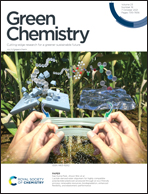Catalytic degradation of melamine–formaldehyde resins into valuable chemicals†
Abstract
The wide application of melamine–formaldehyde resins (MFRs) in the food industry aggravates plastic pollution problems. Recycling of the waste MFRs remains a big challenge due to its compact structure. Herein, a high MFR degradation ratio of ca. 84 wt% was achieved under mild conditions (180 °C) in a methanesulfonic acid (MSA)–tetrahydrofuran (THF)–H2O system with cyanuric acid as the main degradation product. The SEM results showed that the degradation of MFRs followed different reaction mechanisms when H2O and THF were applied as solvents, respectively. The combination of the two solvents showed an obvious synergistic effect for the degradation of MFRs. The degradation experimental results with melamine as the model intermediate indicated that the degradation of MFRs proceeded via the selective cleavage of the sp2C–sp3N and sp3C–sp3N bonds to recover valuable C and N alternated-aromatic ring (CNAR) units, followed by their transformation into a valuable chemical of cyanuric acid.



 Please wait while we load your content...
Please wait while we load your content...